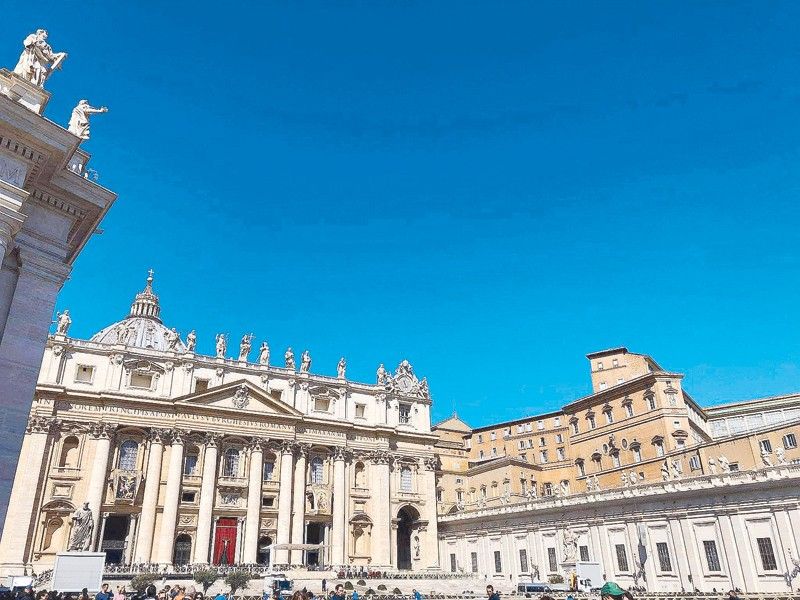Virtual Visita Iglesia in the time of the coronavirus

The Visita Iglesia is a time-honored tradition among Filipino Catholics. The year 2020 must be the one year after the war that the faithful were not just unable, but barred by law, from visiting churches.
Visita Iglesia, which means “Church” visit, was evidently influenced by the Spaniards, whose four-century rule over the Philippines gave us Christianity, specifically the Catholic faith.
I grew up with this Holy Week tradition. It not only made me reflect on the passion and death of Christ, it was a devotion that I usually embarked on with family, further strengthening our ties. Whenever I was fortunate to travel whether here or abroad, I would visit churches, Holy Week or not.
There would always be a feeling of grace whenever I would pray in a church, big or small. I would always leave the church with a soul singing a song of gratitude.
Here are some of the churches I have been blessed to visit, and though we may not be able to visit any churches this season, you can keep some of them in mind in your future travels. Yes, because when we are able to travel again, it means the world has become safe again.
1. St. Peter’s Basilica — St. Peter’s is the largest church in the world and the burial site of Saint Peter, the first pope. Saint Peter’s tomb is directly below the high altar of the basilica. Inside the basilica, is Michaelangelo’s Pietà, and the altar with the Bernini columns. The central feature is a baldachin, or canopy over the papal altar, designed also by Bernini.
One observer wrote: “St. Peter’s Basilica is the reason why Rome is still the center of the civilized world. For religious, historical, and architectural reasons it by itself justifies a journey to Rome, and its interior offers a palimpsest of artistic styles at their best...”

2. Basilica of San Martin de Tours — About an hour’s drive from Tagaytay, Taal is also best known for the Basilica of San Martin de Tours, the largest Catholic church in Asia at 95 meters long and 45 meters wide. The basilica, rebuilt in the 18th century, sits on a hill like a king on a throne. Now, if only the view would be unobstructed from below the hill, it would be more magnificent. The Baroque-style basilica, built by Luciano Oliver (also the architect of the Manila Cathedral) is one of at least seven structures that have been designated as National Historical Landmarks. Its ceiling is of lead and the frescoes on the dome above the silver-gilded altar is as authentic as the Juan Lunas in the National Museum.
Martin de Tours was a fourth-century former pagan soldier who cut his cape in half to clothe a shivering beggar, and thereafter had a life-altering dream. In his dream, Jesus Christ told him He was the beggar, and that when He was naked and cold, Martin saved Him from certain death.
3. Jaro Cathedral — I was confirmed in this cathedral by then Archbishop of Jaro Monsignor Jaime Sin, who later would become Archbishop of Manila Jaime Cardinal Sin. Jaro Cathedral, formally known as Jaro Metropolitan Cathedral and the National Shrine of Our Lady of the Candles, is in Iloilo City, where I grew up. The shrine is constructed in the Romanesque Revival style, deviating from semi-circular arches. A distinctive feature is that the bell tower is located across a busy street from the church, on Jaro Plaza when typically, belfries are built next to their churches. Another feature of the church is its all-male ensemble of saints placed on the main pillars, with the exception of the Virgin’s icon. The arrangement is in response to Molo Church’s all-female theme.

4. Matthias Church, Budapest — The Church of the Assumption of the Buda Castle, more commonly known as the Matthias Church stands proudly on the Holy Trinity Square, Budapest, Hungary, in front of the Fisherman’s Bastion at the heart of Buda’s Castle District. The 11th-century Matthias Church used to be Buda’s primary mosque during the Ottoman occupation of the country. The fascinating colored ceramic tiles of the church’s roof gleam like diamonds in the sun. One of the most photogenic churches I’ve ever been to.
5. Saint Catherine’s Church, Honfleur, France — The only church I’ve been to whose interior looks like the upturned hull of a ship. Not surprising because it was built by shipbuilders. One of Honfleur’s major sites, the 15th-century Saint Catherine’s Church is France’s largest timber-built church with a separate bell tower.
6. San Beda Chapel or The Abbey of Our Lady of Montserrat is a breathtakingly beautiful church in Manila, a stone’s throw away from Malacañang Palace. Thus, it has witnessed a fair share of bombings and coup attempts. The Abbey is a Benedictine monastery founded by monks from Spain in 1895, in the final years of Spanish colonial era in the Philippines and is dedicated to Our Lady of Montserrat. The church is renowned for its paintings that were done by Fr. Lesmes Lopez, OSB and Bro. Salvador Alberich, OSB from 1930 until 1939.

7. Church of the Beatitudes, Israel — During my first trip to the Holy Land in 2000, it was in this church that tears sprung unbidden from my eyes. Located on the Mount of Beatitudes by the Sea of Galilee near Tabgha and Capernaum in Israel, it seems you could see forever from this church.
- Latest





























